#admiral horatio nelson ii
Explore tagged Tumblr posts
Text
2 notes
·
View notes
Text
We should start drawing Top 7 of our favourite historical figures together, anways doodle
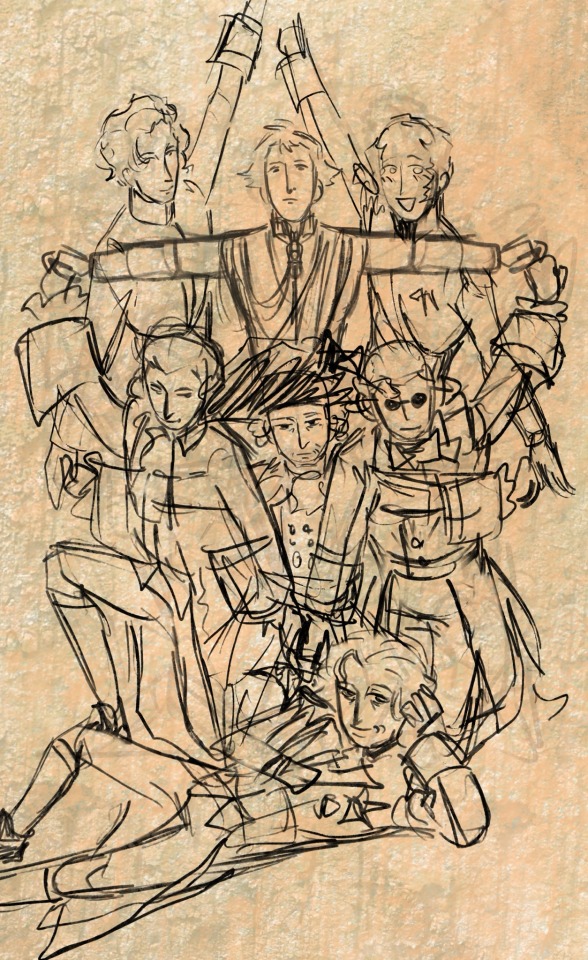
#art#napoleonic era#napoleonic wars#horatio nelson#admiral nelson#tsar alexander i#alexander i of russia#arthur wellesley#duke of wellington#frederick the great#maximillien robespierre#robespierre#mozart#wolfgang amadeus mozart#napoleon ii
225 notes
·
View notes
Text


follow me on twitter (x) for more memes and personal updates!! (ps i follow back!)
292 notes
·
View notes
Text
Friends, enemies, comrades, Jacobins, Monarchist, Bonapartists, gather round. We have an important announcement:
The continent is beset with war. A tenacious general from Corsica has ignited conflict from Madrid to Moscow and made ancient dynasties tremble. Depending on your particular political leanings, this is either the triumph of a great man out of the chaos of The Terror, a betrayal of the values of the French Revolution, or the rule of the greatest upstart tyrant since Caesar.
But, our grand tournament is here to ask the most important question: Now that the flower of European nobility is arrayed on the battlefield in the sexiest uniforms that European history has yet produced (or indeed, may ever produce), who is the most fuckable?
The bracket is here: full bracket and just quadrant I
Want to nominate someone from the Western Hemisphere who was involved in the ever so sexy dismantling of the Spanish empire? (or the Portuguese or French American colonies as well) You can do it here
The People have created this list of nominees:
France:
Jean Lannes
Josephine de Beauharnais
Thérésa Tallien
Jean-Andoche Junot
Joseph Fouché
Charles Maurice de Talleyrand
Joachim Murat
Michel Ney
Jean-Baptiste Bernadotte (Charles XIV of Sweden)
Louis-Francois Lejeune
Pierre Jacques Étienne Cambrinne
Napoleon I
Marshal Louis-Gabriel Suchet
Jacques de Trobriand
Jean de dieu soult.
François-Étienne-Christophe Kellermann
17.Louis Davout
Pauline Bonaparte, Duchess of Guastalla
Eugène de Beauharnais
Jean-Baptiste Bessières
Antoine-Jean Gros
Jérôme Bonaparte
Andrea Masséna
Antoine Charles Louis de Lasalle
Germaine de Staël
Thomas-Alexandre Dumas
René de Traviere (The Purple Mask)
Claude Victor Perrin
Laurent de Gouvion Saint-Cyr
François Joseph Lefebvre
Major Andre Cotard (Hornblower Series)
Edouard Mortier
Hippolyte Charles
Nicolas Charles Oudinot
Emmanuel de Grouchy
Pierre-Charles Villeneuve
Géraud Duroc
Georges Pontmercy (Les Mis)
Auguste Frédéric Louis Viesse de Marmont
Juliette Récamier
Bon-Adrien Jeannot de Moncey
Louis-Alexandre Berthier
Étienne Jacques-Joseph-Alexandre Macdonald
Jean-Mathieu-Philibert Sérurier
Catherine Dominique de Pérignon
Guillaume Marie-Anne Brune
Jean-Baptiste Jourdan
Charles-Pierre Augereau
Auguste François-Marie de Colbert-Chabanais
England:
Richard Sharpe (The Sharpe Series)
Tom Pullings (Master and Commander)
Arthur Wellesley, 1st Duke of Wellington
Jonathan Strange (Jonathan Strange & Mr. Norrell)
Captain Jack Aubrey (Aubrey/Maturin books)
Horatio Hornblower (the Hornblower Books)
William Laurence (The Temeraire Series)
Henry Paget, 1st Marquess of Anglesey
Beau Brummell
Emma, Lady Hamilton
Benjamin Bathurst
Horatio Nelson
Admiral Edward Pellew
Sir Philip Bowes Vere Broke
Sidney Smith
Percy Smythe, 6th Viscount Strangford
George IV
Capt. Anthony Trumbull (The Pride and the Passion)
Barbara Childe (An Infamous Army)
Doctor Maturin (Aubrey/Maturin books)
William Pitt the Younger
Robert Stewart, 2nd Marquess of Londonderry (Lord Castlereagh)
George Canning
Scotland:
Thomas Cochrane
Colquhoun Grant
Ireland:
Arthur O'Connor
Thomas Russell
Robert Emmet
Austria:
Klemens von Metternich
Friedrich Bianchi, Duke of Casalanza
Franz I/II
Archduke Karl
Marie Louise
Franz Grillparzer
Wilhelmine von Biron
Poland:
Wincenty Krasiński
Józef Antoni Poniatowski
Józef Zajączek
Maria Walewska
Władysław Franciszek Jabłonowski
Adam Jerzy Czartoryski
Antoni Amilkar Kosiński
Zofia Czartoryska-Zamoyska
Stanislaw Kurcyusz
Russia:
Alexander I Pavlovich
Alexander Andreevich Durov
Prince Andrei (War and Peace)
Pyotr Bagration
Mikhail Miloradovich
Levin August von Bennigsen
Pavel Stroganov
Empress Elizabeth Alexeievna
Karl Wilhelm von Toll
Dmitri Kuruta
Alexander Alexeevich Tuchkov
Barclay de Tolly
Fyodor Grigorevich Gogel
Ekaterina Pavlovna Bagration
Ippolit Kuragin (War and Peace)
Prussia:
Louise von Mecklenburg-Strelitz
Gebard von Blücher
Carl von Clausewitz
Frederick William III
Gerhard von Scharnhorst
Louis Ferdinand of Prussia
Friederike of Mecklenburg-Strelitz
Alexander von Humboldt
Dorothea von Biron
The Netherlands:
Ida St Elme
Wiliam, Prince of Orange
The Papal States:
Pius VII
Portugal:
João Severiano Maciel da Costa
Spain:
Juan Martín Díez
José de Palafox
Inês Bilbatua (Goya's Ghosts)
Haiti:
Alexandre Pétion
Sardinia:
Vittorio Emanuele I
Lombardy:
Alessandro Manzoni
Denmark:
Frederik VI
Sweden:
Gustav IV Adolph
65 notes
·
View notes
Text
Worldbuilding: How Much Alternate History?
Now here’s a bit of a specific question. If you create an alternate history, how much of it should actually get into your story?
The obvious (and not very helpful) answer is, only as much as your reader needs for the story. If the Sun Kings of France were never deposed, your readers probably don’t need to know that part of the reason that happened was Napoleon Bonaparte choking on a fish bone while he was still a lieutenant.
You might, however, end up alluding to that in a way history buffs will pick up on. For example, having Admiral Horatio Nelson alive and well and still sleeping with a lovely woman who is not his wife... in 1810. Because he never crushed Napoleon’s fleet at Trafalgar, and so was never shot by a French sniper. Sprinkle in enough of these tidbits of clues, and history fans will work out a shape of what must have happened, even if they don’t have the exact details. And then, once you’ve built things up enough, you can drop in a specific ahistorical fact and watch it go off like a firecracker.
...You hope.
The trick there being, how do you figure out what will be small but significant hints, what will have the most impact revealed all at once, and when have you foreshadowed that one firecracker enough that the readers are anticipating a surprise - and will be delightfully satisfied?
And then there’s the compounding element of, how many of your readers actually know the original history in the first place?
...I’m going to go out on a limb here and say that the history of Early Modern Northeast Asia is not exactly a widespread topic of interest. At least not in comparison to the Napoleonic Wars, World Wars I and II, the American Civil War... you get the idea.
Most people are not going to know about great comets, AKA supercomets, much less that there was one in 1264 seen by both European and Chinese astronomers for months. Most people will not have a clue when the Wihwado Retreat happened (1388), why it was important to the foundation of the Joseon Dynasty, or who the heck Choe Yeong was. (A general, and a well-known hero, and when he was executed people knew it was unjust because grass didn’t grow on his grave. No, historically, this is fact - no grass grew on that grave until 1976.)
These are bits I’m going to have to sprinkle in very slowly and carefully, and it will probably take more than one book for our modern historian to try and put some pieces together. Because... well, dropped into a magical world! Figuring out that there are historical reasons things are different, not just the presence of magic, will take a little time.
Crossing my fingers that it’ll work.
(Note: The Wihwado Retreat is part of the opening of the Korean film The Pirates (2014), if you want a smidge of background.)
6 notes
·
View notes
Text
Events 1.1 (1900-1970)
1900 – Nigeria becomes a British protectorate with Frederick Lugard as high commissioner. 1901 – The Southern Nigeria Protectorate is established within the British Empire. 1901 – The British colonies of New South Wales, Queensland, Victoria, South Australia, Tasmania, and Western Australia federate as the Commonwealth of Australia; Edmund Barton is appointed the first Prime Minister. 1902 – The first American college football bowl game, the Rose Bowl between Michigan and Stanford, is held in Pasadena, California. 1910 – Captain David Beatty is promoted to rear admiral, and becomes the youngest admiral in the Royal Navy (except for royal family members) since Horatio Nelson. 1912 – The Republic of China is established. 1914 – The SPT Airboat Line becomes the world's first scheduled airline to use a winged aircraft. 1923 – Britain's Railways are grouped into the Big Four: LNER, GWR, SR, and LMS. 1927 – New Mexican oil legislation goes into effect, leading to the formal outbreak of the Cristero War. 1928 – Boris Bazhanov defects through Iran to seek asylum in France. He is the only member of Joseph Stalin's secretariat to have defected from the Soviet Union. 1929 – The former municipalities of Point Grey, British Columbia and South Vancouver, British Columbia are amalgamated into Vancouver. 1932 – The United States Post Office Department issues a set of 12 stamps commemorating the 200th anniversary of George Washington's birth. 1934 – Alcatraz Island in San Francisco Bay becomes a United States federal prison. 1934 – A "Law for the Prevention of Genetically Diseased Offspring" comes into effect in Nazi Germany. 1942 – The Declaration by United Nations is signed by twenty-six nations. 1945 – World War II: The German Luftwaffe launches Operation Bodenplatte, a massive, but failed, attempt to knock out Allied air power in northern Europe in a single blow. 1947 – Cold War: The American and British occupation zones in Allied-occupied Germany, after World War II, merge to form the Bizone, which later (with the French zone) became part of West Germany. 1947 – The Canadian Citizenship Act 1946 comes into effect, converting British subjects into Canadian citizens. Prime Minister William Lyon Mackenzie King becomes the first Canadian citizen. 1948 – The British railway network is nationalized to form British Railways. 1949 – United Nations cease-fire takes effect in Kashmir from one minute before midnight. War between India and Pakistan stops accordingly. 1956 – Sudan achieves independence from Egypt and the United Kingdom. 1957 – George Town, Penang, is made a city by a royal charter of Queen Elizabeth II of the United Kingdom. 1957 – Lèse majesté in Thailand is strengthened to include "insult" and changed to a crime against national security, after the Thai criminal code of 1956 went into effect. 1958 – The European Economic Community is established. 1959 – Cuban Revolution: Fulgencio Batista, dictator of Cuba, is overthrown by Fidel Castro's forces. 1960 – Cameroon achieves independence from France and the United Kingdom. 1962 – Western Samoa achieves independence from New Zealand; its name is changed to the Independent State of Western Samoa. 1964 – The Federation of Rhodesia and Nyasaland is divided into the independent republics of Zambia and Malawi, and the British-controlled Rhodesia. 1965 – The People's Democratic Party of Afghanistan is founded in Kabul, Afghanistan.
2 notes
·
View notes
Text
History
October 21, 1805 - The Battle of Trafalgar took place between the British Royal Navy and the combined French and Spanish fleets. The victorious British ended the threat of Napoleon's invasion of England. British naval hero Admiral Horatio Nelson was mortally wounded aboard his ship Victory.
October 21, 1879 - Thomas Edison successfully tested an electric incandescent lamp with a carbonized filament at his laboratory in Menlo Park, New Jersey, keeping it lit for over 13 hours.
October 21, 1915 - The first transatlantic radio voice message was made by the American Telephone and Telegraph Company from Virginia to Paris.
October 21, 1944 - During World War II in Europe, American troops captured Aachen in western Germany after a week of hard fighting. It was the first large German city taken by the Allies.
October 21, 1967 - Thousands of anti-war protesters stormed the Pentagon during a rally against the Vietnam War in Washington, D.C. About 250 were arrested. No shots were fired, but demonstrators were struck with nightsticks and rifle butts.
Birthday - Jazz great Dizzy Gillespie (1917-1993) was born in Cheraw, South Carolina (as John Birks Gillespie). He was a trumpet player, composer, band leader and one of the founding fathers of modern jazz, known for his trademark puffed cheeks and bent trumpet.
0 notes
Text
December 2nd, Napoleon’s lucky date...Part II: Austerlitz and afterthoughts with Napoleon III.
One year after the coronation of Napoleon Bonaparte as Napoleon I, Emperor of the French. France found itself at war on many fronts, after having defeated the first two coalitions in the 1790′s and by early 1802, making peace with France’s greatest rival, Great Britain at the Peace of Amiens. By 1803, Britain had declared war again and sought to put together a coalition to confront the newly minted French Empire in 1804. Britain with its mastery of the seas and the Royal Navy was largely unstoppable in a naval sense, it also had great economic wealth with its control of international trade. However, on land Napoleon was the greatest tactical general of his day and the French Army had been whipped into shape as the most formidable force on Continental Europe if not the world, a threat which Britain as this stage could not challenge. Napoleon knew this to be the case and set about building a large army with the express purpose of invading England and bringing about a lasting peace. This Army of England would be floated over on large barges across the English Channel and march to occupy London. However, bad weather and constant patrols by the Royal Navy prevented the invasion from ever taking place. Napoleon held large military parades and marches to boost the morale of his idle troops but never ever came of his plans for England.
Britain couldn’t win on land and France couldn’t win at sea. So the strategy as far as Britain was concerned was to have their Allies, the Austrian and Russian Empires largely do the fighting for them on land and defeat Napoleon, while they mostly blockaded French trade and destroyed their naval capacity. By 1805, subsidies of British gold and Austrian and Russian desire for revenge on France for past defeats, along with the “insult” of Napoleon’s coronation as Emperor combined to start the War of the Third Coalition.
Austria and Russia planned to invade France through Germany. Meanwhile, in October 1805, Britain achieved it’s strategic goal of destroying a combined Franco-Spanish fleet at sea in the Battle of Trafalgar. British Admiral Horatio Nelson, lost his life in the effort but in effect crippled France’s naval capacity for the foreseeable future, postponing plans to invade England indefinitely. With these combined events, Napoleon changed his focus to the German front to face the Austrians who were attacking, France’s main German ally Bavaria. Napoleon marched his Army of England, renamed Le Grande Armee from the shores of northern France into southern Germany. The coming weeks saw him using his army’s reformed Corps system (split full size mini-armies working independently but in close proximity to each other) to cover more ground. He inflicted defeat upon defeat to his Austrian enemy in the Ulm Campaign, which lead to the surrender of most of Austria’s army.
The Allied plans failed in part because of lack of coordination between Austria and Russia, Russia’s army was still far off in the east and due to poor roads made slow progress in time to help their Austrian ally. Nevertheless, surrender was not an option and the Austrian Emperor Francis II/I, ordered a continued withdrawal to the east to link up with the Russians and draw Napoleon away from his supply bases in France and southern Germany. This strategy was at the behest of Russian general Mikhail Kutuzov. Napoleon pursued his enemies into Austrian Bohemia (Czech Republic) and both sides needed a decisive land victory before the onset of winter.
By late November 1805, the Austrians had linked up with the Russians and both the Austrian Emperor Francis II/I and Russian Tsar Alexander I lead their combined armies, allowing the French to occupy Vienna without a true surrender or victory, hoping to lure Napoleon east, sap his strength and defeat him in one fell swoop. Napoleon was aware of this and decided to kick into gear what would become his greatest tactical achievement, the Battle of Austerlitz which would be fought to the day one year after his imperial coronation, on December 2nd, 1805. Austerlitz is located in the modern day Czech Republic, then Austrian Bohemia. Napoleon’s plan involved a combination of deception, knowledge of terrain and geography, weather and perfect timing. All these elements had to be in play for his plan to work. His plan was to feign a retreat to give his enemies the impression he had overextended his army and was in retreat so that they would pursue him. They took the bait, he intentionally weakened his right flank and gave up the high ground of hills known as the Pratzen Heights, a textbook no-no in the art of warfare.
The Russian and Austrian armies despite Kutuzov’s warnings of a possible trap were eager to pursue the French. Due to poor coordination and foggy weather, the Allies marched their armies slowly against the French right flank on the morning of December 2nd. Napoleon however had the bulk of his army strung out to the north with a strong center and left flank obscured by the same fog. The goal was for the Allies to attack the French right flank, ignorant of the French left and center, the Allies would overextend their lines, believing Napoleon had done the same and then when overextended he would rush his left and center to the retake the Pratzen Heights and cutoff the Allies from behind, encircle and destroy them. His right flank was attacked hard but held on and was reinforced in time by the arrival of his III Corps under the command of Marshal Davout who made an all night march to arrive on the battlefield just in time. At just the right moment, seeing the overextended Allies and their weakened center on the Pratzen Heights, Napoleon launched the French center with artillery support against the Pratzen Heights. French infantry in the thousands ascended the hill just as the fog was lifting shocked the Russians, after much bloody fighting and with support from the French left flank, the Pratzen Heights were in French hands once more and the Allies realizing the trap they fell into began to flee in all sectors and many hours of further fighting. The Russians and Austrians retreated in a panic, suffering thousands killed, wounded or captured. The end result was summed up by Tsar Alexander I of Russia “We are babies in the hand of a giant” acknowledging Napoleon’s martial genius. The Austrians quickly signed a treaty ending the war and Russia retreated, only to face the French in support of Prussia a year later in the War of the Fourth Coalition, which also ended in French victory and brought Russia to the peace table in 1807. December 2nd, proved a lucky day indeed for Napoleon, thereafter it was celebrated by his empire and by him personally as a lucky day, for his coronation and his greatest victory.
Decades later, his nephew Charles Louis-Napoleon Bonaparte who became President of the Second French Republic, instituted a coup in Paris on December 2nd, 1851 to seize power and become President for life. One year later another plebiscite referendum was held to ask for the initiation of a new Bonapartist empire, with again overwhelming but manipulated results like his uncle he became, Napoleon III, Emperor of the French. The Second French Empire was officially declared on December 2nd, 1852 and would last until the end of 1870 during French defeat in the Franco-Prussian War. December 2nd, lives on as the single most important date in the Bonapartist legacy as a result of these events...
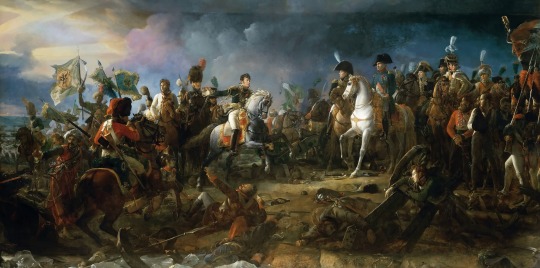
2 notes
·
View notes
Text

You’re invited to get away this winter at Montpelier Plantation & Beach, Nevis, West Indies! The trip will take place from January 25th to February 1st. Of course there are some wonderful things you can do on this island. Under the cut, you will find some places and things to do on the island.
There are several beautiful beaches to just relax, go swimming or have a few drinks at the beach bars:
Lovers Beach // Enjoy the peace and beautiful white sands, swim in the clear blue waters, admire the view across to St Kitts.
Nisbet Beach // Swim, sunbathe, enjoy the ocean breezes. If you follow the path leading east you'll reach the wilder and scruffier sands of Herbert's Beach.
Oualie Beach // On weekdays this is a quiet spot to relax and swim. You can book massages and treatments at the one-hut Chill spa and there's also a dive centre, bike rental, sports fishing and watersports facilities.
Pinney’s Beach // Sundays are busiest when many Nevisians head for the beach and there is usually volleyball, music and large family groups getting together. Hawkers sell souvenirs while other entrepreneurs offer loungers, snacks and watersports.
Windward Beach // Breathe in, walk, beachcomb, enjoy the wide spaces and the crashing Atlantic rollers. Some locals and visitors swim or use bodyboards here, but don't take any risks or do it alone.
There are several places you can visit:
The Caribbean’s First Hotel (Bath Hotel) and the Hot Springs in the Historic Bath Village // Bath Hotel was the built in 1778; it was a playground for the rich and famous who came to Nevis to take in therapeutic hot spring baths. If you have back pain, arthritis or even just a swollen ankle the hot springs is the place for you. One dip and you will be left feeling brand new. The Bath Hotel is now the government headquarters of the Nevis island Administration.
The Horatio Nelson Museum // This is a memoir of artifacts and memorabilia of the life and times of the British Naval Admiral Lord Horatio Nelson, who visited Nevis in the late 18thcentury.
The Botanical Gardens // Created by a Philadelphia couple Joseph and Martha Murphy, this is a garden to preserve flora from throughout the world. The garden is filled with sculptures, fountains, roses, vines, cactuses, fruit trees and orchids. The most outstanding part is the tropical rain forest conservatory, built to emulate the conservatory at Kew Gardens in England. It houses tropical plants and huge Mayan-type sculptures. Weddings, receptionist and private parties are hosted at the gardens as well.
The Mill at Montpelier // The Mill at the Montpelier Planation Inn is 300 years old and was converted into the only restaurant of its kind in the world. For a dining experience like no other, enjoy an intimate candle lit dinner for two, or a private party as the mill seats 24.
The Museum of Nevis History // This is the birthplace of Alexander Hamilton in 1757, he lived on the island until the age of nine. Today the building is known as the “Hamilton House” it houses one of the islands’ two museums on the first floor and the meeting room of the Nevis National Assembly on the second floor.
Visit Cottle Church // John Cottle, once the president of Nevis and a planter, built this tiny church in 1824 as a place for his family and his slaves to worship together.
Visit Nisbet Plantation // Feel perfectly at ease at the Caribbean's only historic plantation inn on a beach. Spread over 30 lush acres, unwind in one of just 36 casually resplendent Caribbean accommodations offering ultimate intimacy and privacy. Stroll the Avenue of the Palms connecting the Great House (c1778) to the sea. Savor island-fresh cuisine. Explore tropical island beauty or simply sway in a beachfront hammock.
Other activities:
Hike Nevis Peak / Water Falls // Take a hike with a personal tour guide to the Nevis Peak. On the trail you will meet six waterfalls, bamboo trees, coco trees, herbs, refreshing cool water and a whole heap of mud and fun. Not only is hiking a great way to keep in shape but it’s good for bonding and sharing stories along the way. Once to the top you will be able to see spectacular views of St. Kitts. If you are lucky you may see a tiny fella (monkey) on the tour as well
A round of Golf at Four Seasons // Not only is it a delight playing a round of golf at the Robert Trent Jones II designed course at Four Season Nevis, you are often joined by green velvet monkeys and they seldom recommend the right club for you shot.
Nevis Plantation and Strand Experience tour // Experience the Best of St Kitts and Nevis when you choose this relaxing five-hour excursion that combines an exhilarating boat ride, a panoramic island tour of Nevis and a Luxury beach break. (x)
History and heritage bike tour // Steep yourself into the rich and fascinating past of beautiful Nevis—Queen of the Caribees—on 2 wheels, with a local guide leading the way. Travel by bike through downtown Charleston and past many of the island's historical landmarks. (x)
Sail and Snorkel Tours // The sails are set as you cruise for a short one hour sail across “the Narrows” to the Southern tip of St. Kitts. The sails are dropped as you enter the snorkel cove which is only accessible by sea, ready for you to suit up and experience some of the underwater world. If snorkeling or swimming is not for you, just relax on the open decks of your catamaran. Enjoy the open bar as we have a leisurely sail back to Nevis.
Nevis Sunset Cruise // Take in the astounding view of the tropical sun melting in the Caribbean Sea’s horizon. Discover an endless, gorgeous waterscape as you cruise over sapphire colored waters with splashes of purples, pinks and oranges. Whether it is a romantic occasion with your loved one or a good times with your friends and family, sit back and watch the breathtaking sunset, while sipping a glass of cold beer or rum punch. A memorable journey!
Horseback Riding // Enjoy the sunset with family and friends, or a romantic trail with your significant other.
Swim with Dolphins // Enjoy an unforgettable fun filled day and fascinating interactive experiences with the most famous dolphin family around the world. Get close up to them and discover their great intelligence, communication skills, social ties and incredible acrobatics, sense of humor and friendliness. Be amazed!
Water Sports // Let’s stop for a minute and imagine the warm tropical breeze gently touching our skin. The crystal blue water knocking the shores and the palm trees blowing in the wind, isn’t this paradise? No lanes no limits just a thrilling experience of its own.
Sources ( 1, 2, 3)
11 notes
·
View notes
Text
21st October
The Night at Trafalgar by Thomas Hardy
The Battle of Trafalgar took place on this day in 1805, when the Royal Navy under Admiral Horatio Nelson defeated the combined fleets of France and Spain off the Spanish port of Cadiz. Nelson himself was killed when the battle was all but over. Standing on the deck of his flagship, HMS Victory, he was fatally wounded by a French sharpshooter from a neighbouring vessel. Nelson subsequently became a national hero.
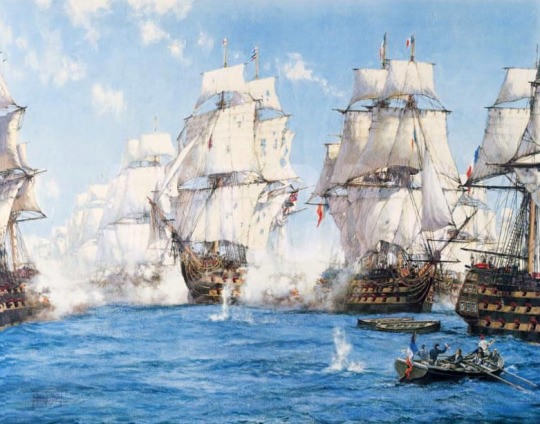
The Battle of Trafalgar, 21st October 1805, during the Napoleonic Wars, by Montague Dawson. Source: Britishbattles.com
The Night at Trafalgar
I
In the wild October night-time, when the wind raved round
the land,
And Black-sea met Front-sea, and our doors were
blocked with sand,
And we heard the drub of Dead-man’s Bay, where the bones of
thousands are
We knew not what the day had done for us at Trafalgar.
Had done,
Had done,
For us at Trafalgar!
II
‘Pull hard, and make the Nothe, or down we go!’ one says,
says he.
We pulled; and bedtime brought the storm; but snug at home
slept we.
Yet all the while our gallants after fighting through the day,
Were beating up and down the dark, sou’-west of Cadiz Bay.
The dark,
The dark,
Sou’-west of Cadiz Bay!
III
The victors and the vanquished then the storm it tossed and
tore,
As hard they strove, those worn out men, upon that surly
shore;
Dead Nelson and his half-dead crew, his foes from near and
far,
Were rolled together on the deep that night at Trafalgar!
The deep,
The deep,
That night at Trafalgar!
Hardy contrasts the comfort of the civilians safe at home in England with the dangers of battle and storm endured by the fighting men of both sides. One of the reasons that Trafalgar became such a famous victory and Nelson became such a posthumous hero, was that the news from the continent had been so bad in 1805, with Napoleon crushing all his enemies (Britain’s allies) in land battles such as Austerlitz.
1 note
·
View note
Text

I posted 1,230 times in 2021
56 posts created (5%)
1174 posts reblogged (95%)
For every post I created, I reblogged 21.0 posts.
I added 60 tags in 2021
#barbados - 11 posts
#sandra mason - 9 posts
#recycledfrockery - 7 posts
#pinterest - 5 posts
#recycled art - 5 posts
#caribbean - 5 posts
#re ausetkmt - 5 posts
#green things - 5 posts
#uk - 4 posts
#caricom - 4 posts
Longest Tag: 85 characters
#barbados gets first president as it becomes republic; replaces queen as head of state
My Top Posts in 2021
#5
The Caribbean island of Barbados on Monday prepared to wave goodbye to Queen Elizabeth II as head of state as it cuts ties with its colonial past and becomes a republic for the first time in history.
The preparations come a month after the parliament of the former British colony once nicknamed “Little England” elected its first-ever president in a two-thirds majority vote following a push to become a republic that began more than two decades ago.
Thousands of people were expected to watch the late-night event on TV, listen to it on the radio or see it in person at a popular square where the statue of a well-known British lord was removed last year amid a worldwide push to eradicate symbols of oppression.
“It should be a historic moment,” said Dennis Edwards, a property manager who was born in Guyana but lives in Barbados.
His son was born on the island, so Edwards said he plans to take him to see the once-in-a-lifetime event: “He’s a Bajan.” The most high-profile guest will be Prince Charles, who arrived Sunday in Barbados, an island of more than 300,000 people and one of the wealthier nations in the Caribbean, dependent on tourism, manufacturing and finance. The Prince of Wales was greeted with a 21-gun salute and is scheduled to speak ahead of the president-elect.
Barbados Governor General Sandra Mason, who was appointed by the queen, is scheduled to be sworn in as president shortly after midnight on Tuesday, which marks the island’s 55th independence from Britain.
“The time has come to fully leave our colonial past behind,” Mason said in a speech to Parliament last month, adding that the move to become a republic should not be seen as a condemnation of anyone and that Barbados looked forward to continuing its relationship with the British monarch.
'This is our moment'
Prime Minister Mia Mottley praised the vote at the time, saying, “We have just elected among us a woman who is uniquely and passionately Barbadian....I can think therefore of no better person at this juncture of our nation.”
Mottley added that the “responsibilities and rights come with the understanding that there is no one else to look over us... This is our moment.”
Mason, 72, is an attorney and judge who also has served as ambassador to Venezuela, Colombia, Chile and Brazil.
Barbados has slowly distanced itself from its colonial past after gaining independence from the United Kingdom in November 1966, more than three hundred centuries after English settlers arrived and turned the island into a wealthy sugar colony based on the work of hundreds of thousands of African slaves.
In 2005, Barbados dropped the London-based Privy Council in favor of the Trinidad-based Caribbean Court of Justice as its final court of appeal. Then in 2008, it proposed a referendum on the issue of becoming a republic, but it was pushed back indefinitely. Last year, Barbados announced plans to stop being a constitutional monarchy and removed a statue of British Vice-Admiral Horatio Nelson from National Heroes Square, the location of the ceremony to celebrate the looming republic status.
Barbados did not need permission from the U.K. to become a republic, although the island will remain a member of the Commonwealth Realm, the first nation to do so after ceasing to be a constitutional monarchy.
The transformation into a republic is an event the Caribbean has not seen since the 1970s, when Guyana, Dominica and Trinidad and Tobago became republics.
Edwards, the Bajan property manager born in Guyana, said his native country faced a difficult time after becoming a republic because a lot of British-owned businesses pulled out at the time.
“It was a very rough patch for years,” he recalled, adding that he expects the results to be much different for Barbados. “It was a different time back then.”
5 notes • Posted 2021-11-30 08:17:10 GMT
#4
The term “toxic positivity” has received a good deal of attention lately. Coming off the back of the “positivity movement” we are beginning to recognise while feeling happy is a good thing, overemphasising the importance of a positive attitude can backfire, ironically leading to more unhappiness.
Yes, research shows happier people tend to live longer, be healthier and enjoy more successful lives. And “very happy people” have more of these benefits relative to only averagely happy people. But pursued in certain ways, happiness or positivity can become toxic.
Our research, published in The Journal of Positive Psychology and involving almost 500 people, was inspired by these apparently inconsistent findings – pursuing happiness may be both good and bad for our well-being. We aimed to uncover a key ingredient that turns positivity toxic.
Expecting the Best, Feeling Worse
Some studies have shown that when people place a high value on their own happiness it can lead to less happiness, especially in contexts where they most expect to feel happy.
This tendency to expect happiness and then to feel disappointed or to blame oneself for not feeling happy enough, has been linked to greater depressive symptoms and deficits in well-being.
As the line to a cartoon by Randy Glasbergen depicting a patient confessing to his psychologist puts it:
I am very, very happy. But I want to be very, very, very happy, and that is why I’m miserable.
However, researchers have also observed when people prioritise behaviours that maximise the likelihood of their future happiness – rather than attempting to directly increase their levels of happiness “in the moment” – they are more likely to experience improvements (rather than deficits) in their levels of well-being.
This may mean engaging in activities that provide a sense of achievement or purpose, such as volunteering time or completing difficult tasks, or constructing daily routines that support well-being.
This work suggests pursuing happiness indirectly, rather than making it the main focus, could turn our search for positivity from toxic to tonic.
Valuing Happiness vs. Prioritising Positivity
We wanted to find out what it was about making happiness a focal goal that backfires.
To gain a better understanding, we measured these two approaches to finding happiness: valuing happiness versus prioritising positivity.
People who valued happiness agreed with statements such as “I am concerned about my happiness even when I feel happy” or “If I don’t feel happy, maybe there is something wrong with me”.
People who prioritised positivity agreed with statements such as “I structure my day to maximise my happiness” or “I look for and nurture my positive emotions”.
We also included a measure of the extent to which people feel uncomfortable with their negative emotional experiences. To do this, we asked for responses to statements like: “I see myself as failing in life when feeling depressed or anxious” or “I like myself less when I feel depressed or anxious”.
People who expected to feel happy (scoring high on valuing happiness), also tended to see their negative emotional states as a sign of failure in life and lacked acceptance of these emotional experiences. This discomfort with negative emotions partly explained why they had lower levels of well-being.
On the other hand, people who pursued happiness indirectly (scoring high on prioritising positivity), did not see their negative emotional states this way. They were more accepting of low feelings and did not see them as a sign they were failing in life.
What this shows is when people believe they need to maintain high levels of positivity or happiness all the time to make their lives worthwhile, or to be valued by others, they react poorly to their negative emotions. They struggle with these feelings or try to avoid them, rather than accept them as a normal part of life.
Pursuing happiness indirectly does not lead to this same reaction. Feeling down or stressed is not inconsistent with finding happiness.
What Makes Positivity Toxic?
So, it appears the key ingredient in toxic positivity is not positivity itself, after all. Rather, it is how a person’s attitude to happiness leads them to respond to negative experiences in life.
The prospect of experiencing pain, failure, loss, or disappointment in life is unavoidable. There are times we are going to feel depressed, anxious, fearful, or lonely. This is a fact. What matters is how we respond to these experiences. Do we lean into them and accept them for what they are, or do we try to avoid and escape from them?
If we are aiming to be happy all the time then we might feel tough times are interrupting our goal. But if we simply put a priority on positivity, we are less concerned by these feelings – we see them as an ingredient in the good life and part of the overall journey.
Rather than always trying to “turn a frown upside down”, we are more willing to sit with our low or uncomfortable emotions and understand that doing so will, in the long run, make us happy.
Learning to respond rather than react to these emotions is a key enabler of our happiness.
Our reaction to discomfort is often to get away and to reduce the pain. This might mean we employ ineffective emotion regulation strategies such as avoiding or suppressing unpleasant feelings.
If we do, we fail to engage with the insights an unpleasant experiences bring. Responding well to these experiences means getting “discomfortable” – being comfortable with our discomfort. Then we can be willing to feel what we feel and get curious about why those feeling are there. Taking this response allows us to increase our understanding, see our choices, and make better decisions.
As the saying goes: “Pain is inevitable. Suffering is optional”.
6 notes • Posted 2021-11-07 13:24:20 GMT
#3

Meet The First President of Barbados - Dame Sandra Mason
7 notes • Posted 2021-11-30 16:36:22 GMT
#2
On this significant occasion and your assumption of office as the first President of Barbados, I extend my congratulations to you and all Barbadians,” the Queen wrote in the letter, as per Sky News.
“I first visited your beautiful country on the eve of independence in early 1966, and I am very pleased that my son is with you today. Since then, the people of Barbados have held a special place in my heart; it is a country rightly proud of its vibrant culture, its sporting prowess, and its natural beauty, that attracts visitors from all over the world, including many people from the United Kingdom,” she added.
UK’s Queen Elizabeth II has sent the people of Barbados her “good wishes” as the Caribbean island country removed the monarch as its head of state and became a republic, ending the almost 400 years of the British royal family being head of states to the island known by some as “Little England”. In a message to the new President of the island Dame Sandra Mason, the Queen congratulated her for new role and wished all Barbadians happiness, peace and prosperity in the future.
Further, Queen Elizabeth talked about Barbados and the United Kingdom ties, stating that both have enjoyed a partnership based on common values, shared prosperity and close collaboration on a wide range of issues, including recent work on climate change. She added that is also a “source of great satisfaction” that Barbados remains an active participant within the Commonwealth. Now, the Queen looks forward to the continuation of the friendship between the two nations and peoples.
As you celebrate this momentous day, I send you and all Barbadians my warmest good wishes for your happiness, peace and prosperity in the future. Elizabeth R,” the letter concluded.
Charles to reaffirm ‘myriad’ connections between UK and Barbados

Meanwhile, Prince Charles travelled to the island on Sunday and he was greeted with a 21-gun salute. Now, he is due to deliver a speech in which he will stress the importance of the “myriad of connections” that remain between Britain and Barbados. According to Sky News, the Prince of Wales is also expected to allude to the country’s colonial past and the tens of thousands of enslaved Africans who were brought there to work on the sugar plantations.
It is to mention that the last time the Queen was removed as head of a state was in 1992 when Mauritius proclaimed itself a republic. This means that the Queen now remains monarch of 15 realms, including the UK. The Caribbean island, on the other hand, is witnessing a transformation into a republic after the 1970s when Guyana, Dominica and Trinidad and Tobago became republics.
18 notes • Posted 2021-11-30 08:17:02 GMT
#1
Sandra Mason after she was made a Dame Grand Cross of the Order of St Michael and St George, at Buckingham Palace on March 23, 2018 in London.
Barbados has elected its first-ever president to replace Britain's Queen Elizabeth as head of state, in a decisive step toward shedding the Caribbean island's colonial past.
Sandra Mason was elected late on Wednesday by a two-thirds vote of a joint session of the country's House of Assembly and Senate. In a statement, the government called her appointment a milestone on its "road to republic."A former British colony that gained independence in 1966, the nation of just under 300,000 had long maintained ties with the United Kingdom's monarchy.
But many Barbadians have long agitated to remove the Queen's status -- and with it, the lingering symbolic presence of imperialism over its governance. Multiple leaders this century have proposed that the country become a republic.
That will finally happen on November 30, the country's 55th anniversary of independence from Britain, when Mason will be sworn in.
A former jurist who has been governor-general of the island since 2018, Mason was also the first woman to serve on the Barbados Court of Appeals.

Barbados will drop Queen Elizabeth II as its head of state next year, government announces
Barbados Prime Minister Mia Mottley called the election of a president "a seminal moment" in the country's journey.
"We have just elected from among us a woman who is uniquely and passionately Barbadian, does not pretend to be anything else (and) reflects the values of who we are," Mottley said after Mason's election.Several countries dropped the Queen as head of state in the years after they gained independence, with Mauritius the last to do so, in 1992. That makes Barbados the first country in nearly three decades to drop the monarch.
The Queen is still head of state in more than a dozen other countries that were formerly under British rule, including Australia, Canada, New Zealand and Jamaica.Wazim Mowla of the Atlantic Council think tank told Reuters the election could benefit Barbados both at home and abroad.
The move makes Barbados, a small developing country, a more legitimate player in global politics, Mowla said, but could also serve as a "unifying and nationalistic move" that may benefit its current leadership at home."Other Caribbean leaders and their citizens will likely praise the move, but I don't expect others to follow suit," Mowla added. "This move will always be considered only if it is in the best interest of each country."
Mottley said the country's decision to become a republic was not a condemnation of its British past."We look forward to continuing the relationship with the British monarch," she said.
271 notes • Posted 2021-11-30 08:17:32 GMT
Get your Tumblr 2021 Year in Review →
0 notes
Text

He's happy because I left my PC to spend time with him (again)
#this was us for like a month#bone chatter#he was upset because i stopped living on the couch with him#as my roommate put it#admiral horatio nelson ii
3 notes
·
View notes
Text

They arrived!!
I think I made too many keychains..
Close ups


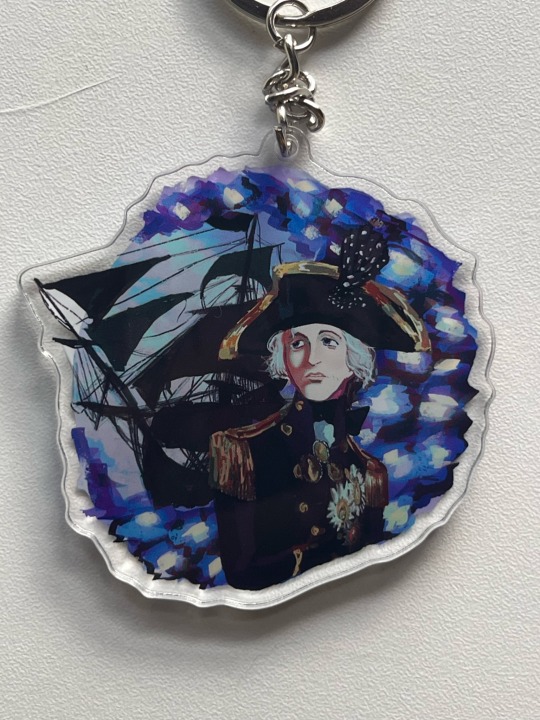

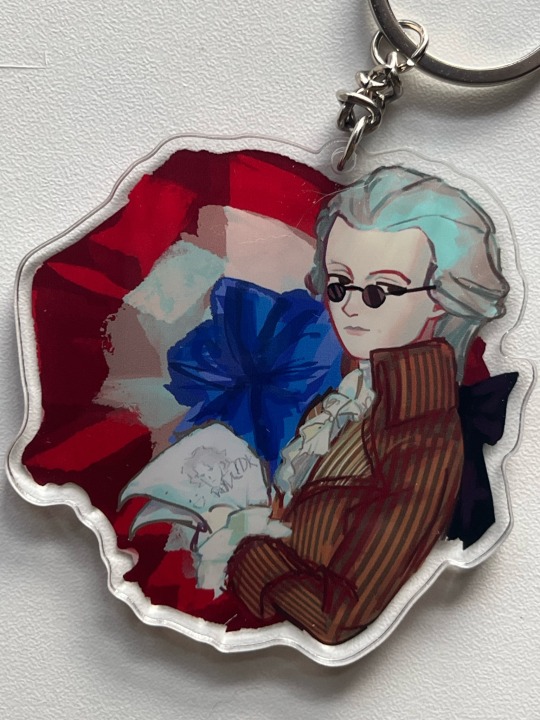
#napoleonic era#napoleonic wars#horatio nelson#admiral nelson#frederick vi of denmark#frederick the great#napoleon ii#maximillien robespierre#robespierre
171 notes
·
View notes
Text
Capítulo 62 : Georges Hanover - Cartagena 1741 - Inglaterra Pirata en el Siglo 18
.
El Hilo conductor de este Libro y sus Narrativas es Francisco Santander y su Viaje 1829 a 1832.
Santander siempre creyó en los Congresos Constituyentes, en la Constitución y las Leyes. Siendo un General Vencedor vió un Gran Peligro en el Militarismo, en Julio César proclamándose Dictador en Roma, y le aterra Napoleón Bonaparte y sus Crímenes. El Mundo de Santander es Democracia y Libertad y esta solo la da la Legalidad y la Juridicidad emanada del Pueblo.
Depués de su Gran Victoria el 7 de Agosto de 1819 organiza el Congreso de Cúcuta para Constitución y Leyes. Este Congreso lo nombra VicePresidente de la Nueva Granada. Cumple esas funciones como gran Administrador que consigue todos los Suministros para las Guerras de Bolívar, y en 1928 está organizando otro Congreso cuando Bolívar se proclama Dictador y lo echa. Luego viene un Atentado contra Bolívar y este último lo culpa y condena a Muerte en una Corte Sumaria o Canguro. Solo el gran Amor que por el existe en el Pueblo lo salva de ser fusilado.
Durante su VicePresidencia y Presidencia encargada tuvo que hablar con muchos Cartageneros que le contaron el Sitio del Pacificador Pablo Morillo contra la Ciudad Heroica desde el 22 de Agosto de 1815 hasta el 6 de Diciembre en que vence por Hambre y Enfermedad a Cartagena.
Muchos Cartageneros le contarían a Santander, conjeturo yo, que sus Abuelos les contaban el Sitio del Almirante Inglés Edward Vernon contra Cartagena y como la Ciudad se salvó con el Heroísmo de todos. Este había sido comisionado por el Rey de Inglaterra George II de la Casa Hanover. Aquí estudiamos esa Dinastía con Terribles escándalos de Reinas adúlteras y Reyes asesinos.
Como no vamos a amar a Inglaterra o al mas grande Reino Unido ??
Claro que amamos a Inglaterra UK. Ese País ha dado Grandes Estadistas de la Democracia y de la Libertad en el Siglo 19 y el Siglo 20.Son muy admirables y Ejemplo. En el Siglo 21 todavía no hemos visto esos Grandes.
Yo creo que Inglaterra es nuestra Madre. Pero puedo equivocarme y me van a crucificar. Entonces digo que Inglaterra es nuestra Tía, una Comadre vecina, o una Partera de nuestro Nacimiento. O por lo menos es la Vecina que nos pone Inyecciones, a nosotros Niños pequeños.
Pero como hay que equilibrar la Balanza, entonces digo que Inglaterra en la Primera Mitad del Siglo 18 es el Reino de la Piratería, el Asalto a Cartagena 1741 es la Glorificación de la Piratería, Edward Vernon es el Pirata Mayor como se decía antes. Y el Episodio cierra con Broche de Oro, la Historia de la Piratería en el Caribe.
Mucha Simpatía había en Inglaterra, su Prensa, su Parlamento y su Corte Real por los Piratas y Contrabandistas Ingleses que arruinaban el Imperio Español. Pero todo fracasó y entonces comienza la Operación de Piratería mayor que es la Conquista de la India que empieza en 1757, 16 Años después del Desastre en Cartagena.
**********************************************
La Guera de 30 Años y el Surgimiento fenomenal de Europa del Norte mientras se queda atrás Europa del Sur, excepto Francia.
En Capítulos anteriores vimos la Guerra de los 30 Años entre Católicos y Protestantes entre 1618-1648. Esta Guerra devastó mucho a Alemania y diezmó su Población. Su Resultado fue que se debilitaron las Potencias Católicas Austria y España y se fortalecieron los Países del Norte, especialmente Holanda y Suecia.
Inglaterra no se metió mucho y no hizo casi nada en esta Guerra. En 1603 murió Elizabeth I y ascendió al Trono James I, hijo de Mary Stuart asesinada por Elizabeth, y James I muere en el Año 1625 y es reemplazado por Charles I que es ejecutado por el Tirano Militar Oliver Cromwell en 1649.
A pesar de las Revoluciones y Problemas en Inglaterra el País progresa mucho Económicamente y ya en Tiempos de las Reinas Mary II y Anne empieza la Revolución Industrial. Y gracias a la Guerra de los 30 Años progresa Europa del Norte Protestante, mientras se queda atrás Europa del Sur, excepto Francia que Richelieu alió con los Protestantes durante la Guerra de 30 Años.
.
Empieza la Dinastía Hanover de los Georges
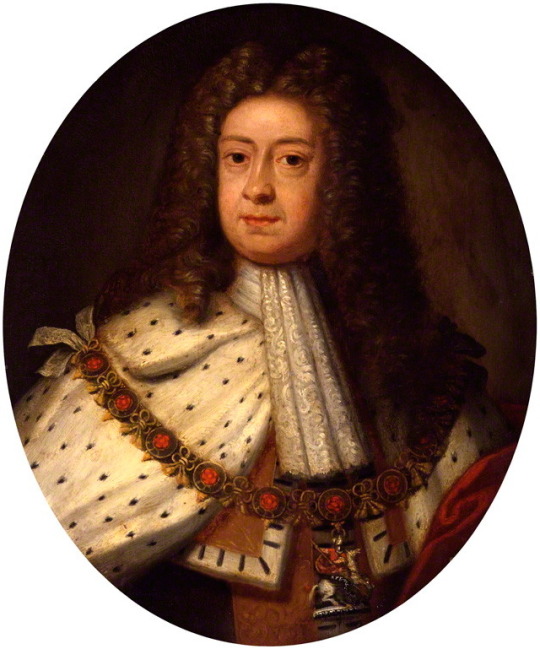
George I, el Primer Rey de la Dinastía Hanover en Inglaterra, pintado en 1714, Año de su Ascenso al Trono Inglés.
Muere la Reina Anne sin descendencia y el Parlamento Británico elige a su Pariente Protestante George I como su sucesor. El es Rey de Hanover. Se han brincado a su medio Hermano James que es Católico y también Stuart como Anne. George I gobierna de 1714 a 1729.
Con este Rey aumenta el Poder del Parlamento Británico, el Rey no sabe nada de Inglés al Principio y la Prensa aumenta su Poder ridiculizando al Rey. Empieza la Costumbre Inglesa de ser la Prensa mas Libre de todo el Mundo ridiculizando a los Cuatro Reyes Hannover de nombre George. Empieza también la Costumbre de que todos estos Georges viven en continuo Conflicto con su Hijo mayor el Príncipe de Gales ( Wales ).

El Rey George I de Hannover en Realidad es un Príncipe Elector
Vea el Mapa, Después de pasar 2 Meses en Hamburg, que es donde llega inicialmente, Santander parte el 15 de Diciembre en un Carruaje ( en Pleno Invierno y frío Alemán) pasa por Hannover y lo describe y luego sigue a Frankfurt. En Capítulos anteriores hay Pinturas, Mapas e Ilustraciones detalladas y el Diario de Santander describiendo todo el Viaje.
Antes de ser Rey de Inglaterra George tenía su Bella Amante y su Esposa Reina era Sophia Dorothea de Celle, con la cual se casó por Interés para apropiarse de el Reino o Feudo vecino de Celle le fue infiel con un Conde Sueco. George pagó para que mataran al Conde Sueco y encerró a su Esposa de por Vida en un Castillo.
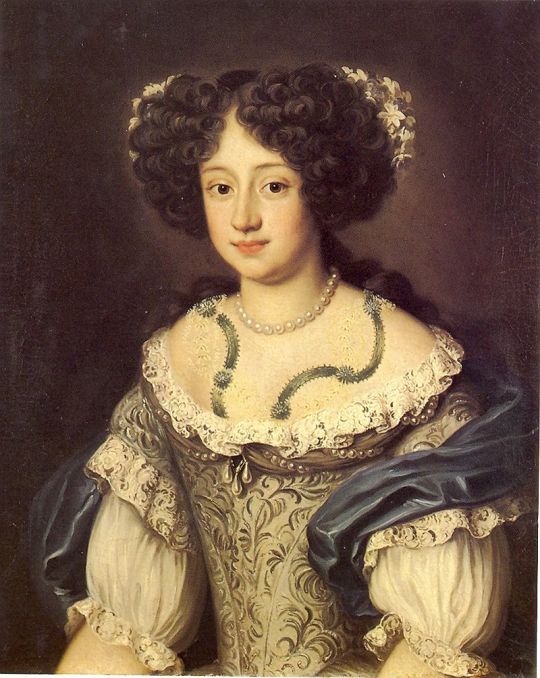
Sophia Dorothea, Reina de Hanover y Celle.
Esta Reina era muy terca o muy aficionada a los Placeres de la Carne. Pues le advirtieron mucho que no siguiera con el Conde Sueco y no hizo caso. George I ordenó y pagó pa matar al Sueco y encerrar a Sophia Dorothea por 30 Años en un Castillo hasta su Muerte. Su único hijo Varón será el Rey George II que peleaba mucho y detestaba a su Padre.
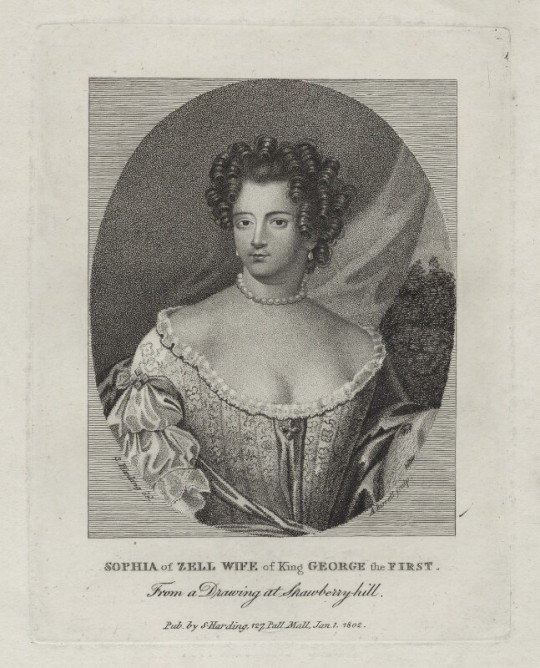
Sophia Dorothea de Celle, la Reina de Hanover, prisionera por 30 Años hasta su Muerte. Madre del Rey George II que ataca a Cartagena en 1741.
A George II se le ocurrió la excelente idea de Conquistar a Cartagena de 1740 a 1742. Y si hacemos el Ridículo cuando intentamos hablar Inglés por algo será.
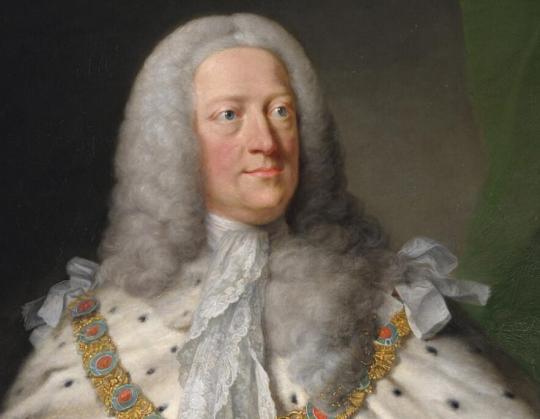
Pintura de George II, este es Hijo de la Adúltera Sophia Dorothea de Celle, antes de que encaprichara con el Conde Sueco, lo que trajo su Ruina. Odiaba a su Padre George I y fue el Rey Inglés que atacó a Cartagena en 1741
Esta Historia continua con las Lecciones aprendidas en el Fracaso de Cartagena, para el General George Washington y para el Almirante Horatio Nelson. Pero no las aprendió bien Winston Churchill en Gallipoli 1915-16 que queda en Turquía muy cerca de la Troya Homérica en los Dardanelos. Fracaso Británico en la Primera Guerra Mundial.
Dicen una Película nueva muy famosa y buena que mientras Eisenhower y Montgomery dirigían el Desembarco Anfibio en Normandía, Winston Churchill estaba borracho y fumando demasiado y lloraba por haber errado en Gallipoli, desembarco anfibio fracasado. No sé si eso es cierto, pero los Colombianos de bien amamos mucho a Winston Churchill y es un Ejemplo para nosotros.
***********************************************
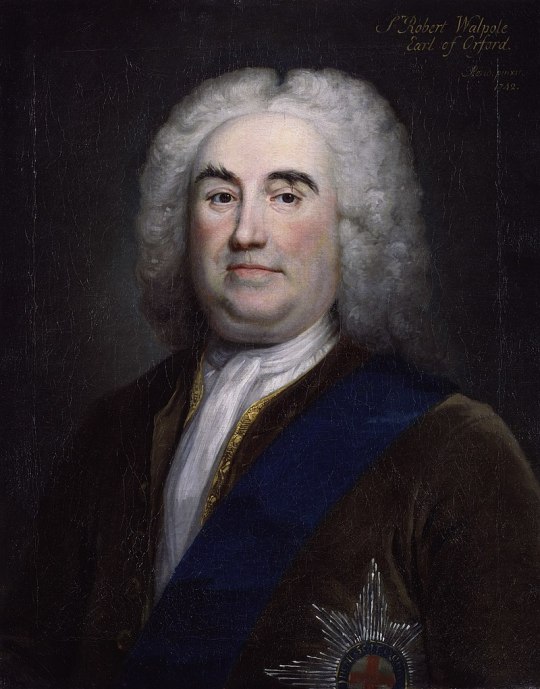
Robert Walpole 1676 - 1645, uno de los mas Grandes Estadistas que Inglaterra ha tenido en su Historia. Primer Ministro de George I y luego de George II durante 20 Años continuos sin Interrupción. Es el Primer Ministro que mas Tiempo ha durado en la Historia del Reino Unido. Fue muy calmado, moderado y tolerante en sus Políticas, era muy Amigo de la Paz y se esforzaba para que no hubiera Guerras. Era muy Amigo de la Tolerancia Religiosa, de los Bajos Impuestos y de favorecer el Comercio Internacional sin Altos Aranceles o Guerras Comerciales.
Lo apreciaban y querían mucho en el Parlamento por su buen Talante y Don de Gentes. Le gustaba enriquecerse y el Dinero, nada extraño en esa Epoca. Robert Walpole era un Whig que en esa Epoca significaba estar por la Dinastía Hanover contra la Dinastía Stuart de un Pretendiente James en Francia. Los Tories eran los mas Amigos del Catolicismo, de un poco de Libertad para Irlanda y Escocia y de no hacer Guerras contra Francia. Walpole defendía los Principios de la “Revolución Gloriosa” de 1688, la que trajo a la Reina Protestante Mary II a Inglaterra a gobernar, a pesar de que era Stuart. O sea que no sentía Simpatía por el “Internacionalismo” y la Tolerancia Religiosa mas amplia de los Tories, sus Rivales. Estaba aliado con los mas Pro-Protestantes Whigs pero conquistaba Amigos en los Tories.
Walpole discutió contra el Almirante Edward Vernon en el Parlamento Británico. A Walpole le parecía peligrosa, absurda y contraproducente la Aventura de Cartagena. Pero el Parlamento arrastró al Primer Ministro y al Rey a esta Locura y Walpole quedó muy incómodo.
Fracasó la Gran Aventura Pirata de Cartagena 1741 y ahora si le echaron la Culpa a Walpole. En Enero de 1742 perdía los Votos en el Parlamento y se dió Cuenta de que había concluído su Carrera Política, le renunció al Rey George II y este último lloró y le pidió que siguiera de Amigo y Consejero.
-
Sobrá decir que vienen mas Capítulos, Pinturas, Ilustraciones, Dibujos sobre el Cartagenazo 1741
.
0 notes
Text
With two days left to submit nominees, here is where the list stands:
France:
Jean Lannes
Josephine de Beauharnais
Thérésa Tallien
Jean-Andoche Junot
Joseph Fouché
Charles Maurice de Talleyrand
Joachim Murat
Michel Ney
Jean-Baptiste Bernadotte (Charles XIV of Sweden)
Louis-Francois Lejeune
Pierre Jacques Étienne Cambrinne
Napoleon I
Marshal Louis-Gabriel Suchet
Jacques de Trobriand
Jean de dieu soult.
François-Étienne-Christophe Kellermann
Louis Davout
Pauline Bonaparte, Duchess of Guastalla
Eugène de Beauharnais
Jean-Baptiste Bessières
Antoine-Jean Gros
Jérôme Bonaparte
Andrea Masséna
Antoine Charles Louis de Lasalle
Germaine de Staël
Thomas-Alexandre Dumas
René de Traviere (The Purple Mask)
Claude Victor Perrin
Laurent de Gouvion Saint-Cyr
François Joseph Lefebvre
Major Andre Cotard (Hornblower Series)
Edouard Mortier
Hippolyte Charles
Nicolas Charles Oudinot
Emmanuel de Grouchy
Pierre-Charles Villeneuve
Géraud Duroc
Georges Pontmercy (Les Mis)
Auguste Frédéric Louis Viesse de Marmont
Juliette Récamier
Bon-Adrien Jeannot de Moncey
Louis-Alexandre Berthier
Étienne Jacques-Joseph-Alexandre Macdonald
Jean-Mathieu-Philibert Sérurier
Catherine Dominique de Pérignon
England:
Richard Sharpe (The Sharpe Series)
Tom Pullings (Master and Commander)
Arthur Wellesley, 1st Duke of Wellington
Jonathan Strange (Jonathan Strange & Mr. Norrell)
Captain Jack Aubrey (Aubrey/Maturin books)
Horatio Hornblower (the Hornblower Books)
William Laurence (The Temeraire Series)
Henry Paget, 1st Marquess of Anglesey
Beau Brummell
Emma, Lady Hamilton
Benjamin Bathurst
Horatio Nelson
Admiral Edward Pellew
Sir Philip Bowes Vere Broke
Sidney Smith
Percy Smythe, 6th Viscount Strangford
George IV
Capt. Anthony Trumbull (The Pride and the Passion)
Barbara Childe (An Infamous Army)
Doctor Maturin (Aubrey/Maturin books)
Scotland:
Thomas Cochrane
Colquhoun Grant
Austria:
Klemens von Metternich
Friedrich Bianchi, Duke of Casalanza
Franz I/II
Archduke Karl
Marie Louise
Franz Grillparzer
Wilhelmine von Biron
Poland:
Wincenty Krasiński
Józef Antoni Poniatowski
Józef Zajączek
Maria Walewska
Władysław Franciszek Jabłonowski
Adam Jerzy Czartoryski
Antoni Amilkar Kosiński
Zofia Czartoryska-Zamoyska
Stanislaw Kurcyusz
Russia:
Alexander I Pavlovich
Alexander Andreevich Durov
Prince Andrei (War and Peace)
Pyotr Bagration
Mikhail Miloradovich
Levin August von Bennigsen
Pavel Stroganov
Empress Elizabeth Alexeievna
Karl Wilhelm von Toll
Dmitri Kuruta
Alexander Alexeevich Tuchkov
Barclay de Tolly
Fyodor Grigorevich Gogel
Ekaterina Pavlovna Bagration
Prussia:
Louise von Mecklenburg-Strelitz
Gebard von Blücher
Carl von Clausewitz
Frederick William III
Gerhard von Scharnhorst
Louis Ferdinand of Prussia
Friederike of Mecklenburg-Strelitz
Alexander von Humboldt
Dorothea von Biron
The Netherlands:
Ida St Elme
Wiliam, Prince of Orange
The Papal States:
Pius VII
Portugal:
João Severiano Maciel da Costa
Spain:
Juan Martín Díez
José de Palafox
Inês Bilbatua (Goya's Ghosts)
Haiti:
Alexandre Pétion
Sardinia:
Vittorio Emanuele I
Denmark:
Frederik VI
Sweden:
Gustav IV Adolph
12 notes
·
View notes
Photo

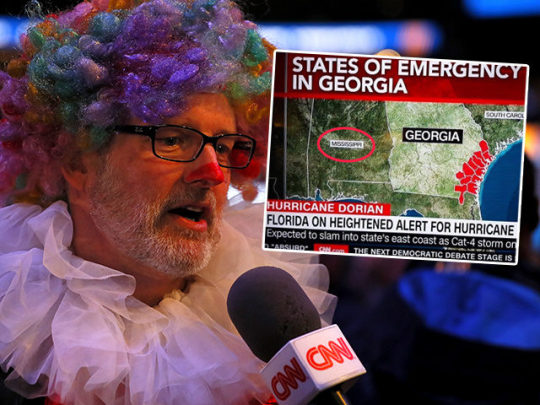
Putin Offers To Protect America After US Marines Admit US Navy Is Obsolete—But Notes They Didn’t Accept His Warning Two Days Before 9/11 Attack
By: Sorcha Faal
A striking new Security Council (SC) report circulating in the Kremlin today asserting that Russia and the United States cannot afford the luxury of losing the New Start nuclear treaty, states that this assertion is based upon shock findings just revealed by US Marine General David Berger—the 38th Commandant of the Marine Corps (CMC) whom President Trump installed in power on 11 July 2019—who then quickly presented to his Commander-In-Chief President Trump two scathing documents titled “38th Commandant’s Intent” and “38th Commandant’s Planning Guidance”—both of which gave “the most visionary, disruptive, and transformational guidance issued by any of the service chiefs since the end of the Cold War”—whose conclusions of documented that the US Navy can no longer be depended upon to protect US Marine forces because it’s obsolete—a finding known to President Putin who has kept Russian naval forces from expanding beyond the bare minimum of warships needed for defensive operations—which is why he offered to sell Russia’s highly advanced undefeatable hypersonic missiles to President Trump so America can be protected—but is a nation that refused to listen to Putin when he warned them on 9 September 2001 that they were about to be attacked—and whose cost of refusing to heed this warning, lead to the deaths of nearly 3,000 Americans when they were attacked two days later on 11 September 2001.
According to this report, the United States Marine Corps (USMC) is a branch of the United States Armed Forces responsible for conducting expeditionary and amphibious operations with the United States Navy (USN)—whose largest building block of combat power is the Marine Expeditionary Force (MEF)—most commonly is known as “The Tip Of The Spear” because it’s the first force to enter combat—after which it’s replaced by the much more powerful, but slower moving, United States Army (USA) combat land force.
During World War II, this report continues, the US Marines proved to be one of the most effective fighting forces in modern history during their campaign against the Empire of Japan throughout the Pacific Ocean region—after which they remained the world’s premier amphibious fighting force for the next 37-years—that is until 1982 when the Falklands War erupted between Argentina and the United Kingdom—a 10-week undeclared war whose major consequence of shook to their very foundations every naval force in the world—and was because Argentina used a primitive by today’s standards inexpensive anti-ship missile to sink the multi-billion-dollar British warship HMS Sheffield.
During the 18th Century, this report details, the famed British Admiral Horatio Nelson warned “a ship’s a fool to fight a fort”—a warning not heeded by his 19th Century counterparts in the British Navy who tried and failed to pound Fort McHenry into surrender during their War of 1812 with the United States—and whose victory by Fort McHenry over the British naval fleet is celebrated daily in America every time its citizens rise to sing its Star Spangled Banner national anthem that celebrates it.
In the Falklands War, however, this report explains, the very definition of a “fort” Admiral Nelson warned that ships would be foolish to fight against, radically changed for the first time in history from being a land based coastal fortified position, to its being an increasingly sophisticated range of over-the-horizon anti-ship missiles that render surface ships vulnerable and near defenseless—a vulnerability terrifyingly proved to be true by the United States itself in 2002—and was when the most expensive war game in its nation’s history saw Iran decimating US Navy warships and killing thousands of American sailors with their highly accurate and cheap anti-ship missiles---thus making it no surprise when, in 2013, the US military began estimating that Communist China could produce 1,227 ballistic anti-ship missiles for the cost of a single US Navy aircraft carrier—two of which Chinese Admiral Lou Yuan has already warned his nation is going to sink, along with their 10,000 American sailors.
With it being said that a time-traveler coming from Colonial America (who used Fort McHenry to protect their nation against the might of the British fleet) to our present day consumer paradise would have a harder time coming to grips with the despoiled religious landscape than the shiny technological one, this report concludes, the grave question now being asked is "Will America’s embrace of atheism be the death of us all?”—a critical question needed to be answered as the godless socialists controlling nearly the entire media establishment in America have yet to tell their citizens General Berger’s grave warning that their US Navy can no longer protect his own US Marine forces or their nation—but whom, to their great shame, have devoted the past 24-hours to giving an astonishing 145-minutes of news time to a scandal these leftist lunatics are calling “Sharpiegate”—a scandal they claim was caused when President Trump took a sharpie pen and drew an extended line on a map to falsely show Alabama was threatened by Hurricane Dorian—a claim these godless leftists were only able to make when they changed their map to name Alabama as Mississippi—has them now demanding that Trump be put in prison for 90 days because he gave false weather information—but whose true reality of shows that this hurricane did, in fact, have an initial track that threatened Alabama—and is why Alabama activated its national guard.
1 note
·
View note